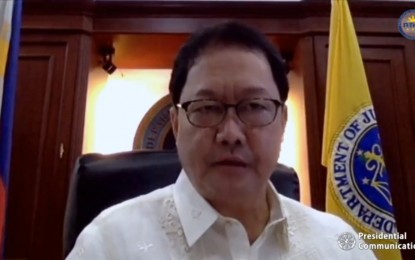
Justice Secretary Menardo Guevarra (File photo)
MANILA – Government lawyers are expected to complete the drafting of the implementing rules and regulations (IRR) of the anti-terror law within three months, Justice Secretary Menardo Guevarra said on Monday.
"I believe that we can finish the IRR within the 90-day period provided under the anti-terrorism law," Guevarra said in a message to reporters.
He said the DOJ legal team has started drafting the IRR of Republic Act 11479 or the Anti-Terrorism Act of 2020 (ATA) which President Rodrigo Duterte signed last July 3.
“We shall consult our law enforcement and military institutions as we go along. We shall also coordinate with intelligence agencies for inputs. Then, we'll present an initial draft to the anti-terrorism council for consideration," he said.
Guevarra, however, said it is "too early to say" whether the inclusion of provisions for social media will be included in the IRR draft.
Solicitor General Jose Calida earlier said RA 11479 is already in effect even if the government has yet to craft its IRR.
Calida, citing precedent cases previously decided on by the Supreme Court, such as SEC v. IRC decided in 2008, said laws are not contingent on the implementing rules.
He also said the law has already complied with the requirement of publication having been published in both the online and print copy of the Official Gazette as required by law.
The ATA was not only posted on the Official Gazette’s website on July 3 but was also subsequently published on the print edition of Official Gazette on July 6.
He added that the law is "self-executing", except for provisions in the law delegating functions to the Anti-Terrorism Council and the Bureau of Jail Management and Penology and Bureau of Corrections to craft purely administrative rules for the effective implementation of policies.
In an earlier consolidated comment filed before the SC, Calida said suits questioning the law are premature and pointed out the absence of cases or "actual controversies involving rights which are legally demandable and enforceable".
He added the petitioners' invocation that the law would create a "chilling effect" is insufficient to bring their claims under the penal statute and is not susceptible to a "facial" challenge before the courts.
Citing precedent cases, the top government counsel said one can challenge the constitutionality of a statute only if he asserts a violation of his own rights.
He also said since every law is presumed valid, the party should rebut this presumption.
Calida said to justify the nullification of law, there must be a clear and unequivocal breach of the Constitution and not one that is doubtful, speculative, or argumentative.
He added that the law is consistent with the country's commitment under the United Nations Security Council (UNSC) Resolution No. 1624 adopted on Sept. 14, 2005, which among others, "reaffirmed the imperative to combat terrorism in all of its forms and manifestly by all means in accordance with the charter of the UN".
The UNSC resolution also calls on member states to repudiate attempts at the justification or glorification of terrorist acts that may incite similar acts. (PNA)
